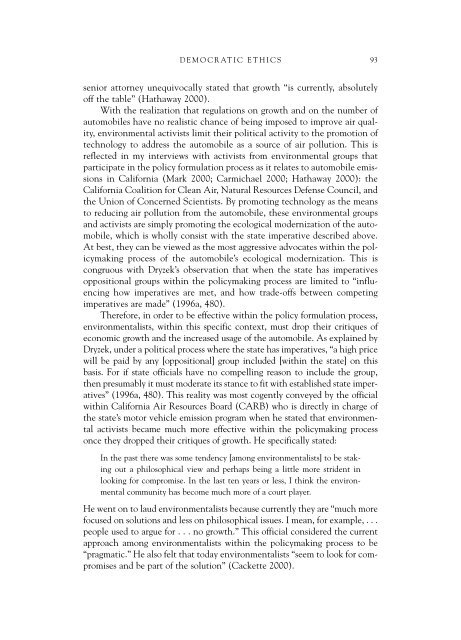GEORGE A. GONZALEZ - fieldi
GEORGE A. GONZALEZ - fieldi
GEORGE A. GONZALEZ - fieldi
Create successful ePaper yourself
Turn your PDF publications into a flip-book with our unique Google optimized e-Paper software.
DEMOCRATIC ETHICS 93senior attorney unequivocally stated that growth “is currently, absolutelyoff the table” (Hathaway 2000).With the realization that regulations on growth and on the number ofautomobiles have no realistic chance of being imposed to improve air quality,environmental activists limit their political activity to the promotion oftechnology to address the automobile as a source of air pollution. This isreflected in my interviews with activists from environmental groups thatparticipate in the policy formulation process as it relates to automobile emissionsin California (Mark 2000; Carmichael 2000; Hathaway 2000): theCalifornia Coalition for Clean Air, Natural Resources Defense Council, andthe Union of Concerned Scientists. By promoting technology as the meansto reducing air pollution from the automobile, these environmental groupsand activists are simply promoting the ecological modernization of the automobile,which is wholly consist with the state imperative described above.At best, they can be viewed as the most aggressive advocates within the policymakingprocess of the automobile’s ecological modernization. This iscongruous with Dryzek’s observation that when the state has imperativesoppositional groups within the policymaking process are limited to “influencinghow imperatives are met, and how trade-offs between competingimperatives are made” (1996a, 480).Therefore, in order to be effective within the policy formulation process,environmentalists, within this specific context, must drop their critiques ofeconomic growth and the increased usage of the automobile. As explained byDryzek, under a political process where the state has imperatives, “a high pricewill be paid by any [oppositional] group included [within the state] on thisbasis. For if state officials have no compelling reason to include the group,then presumably it must moderate its stance to fit with established state imperatives”(1996a, 480). This reality was most cogently conveyed by the officialwithin California Air Resources Board (CARB) who is directly in charge ofthe state’s motor vehicle emission program when he stated that environmentalactivists became much more effective within the policymaking processonce they dropped their critiques of growth. He specifically stated:In the past there was some tendency [among environmentalists] to be stakingout a philosophical view and perhaps being a little more strident inlooking for compromise. In the last ten years or less, I think the environmentalcommunity has become much more of a court player.He went on to laud environmentalists because currently they are “much morefocused on solutions and less on philosophical issues. I mean, for example,...people used to argue for ... no growth.” This official considered the currentapproach among environmentalists within the policymaking process to be“pragmatic.” He also felt that today environmentalists “seem to look for compromisesand be part of the solution” (Cackette 2000).









